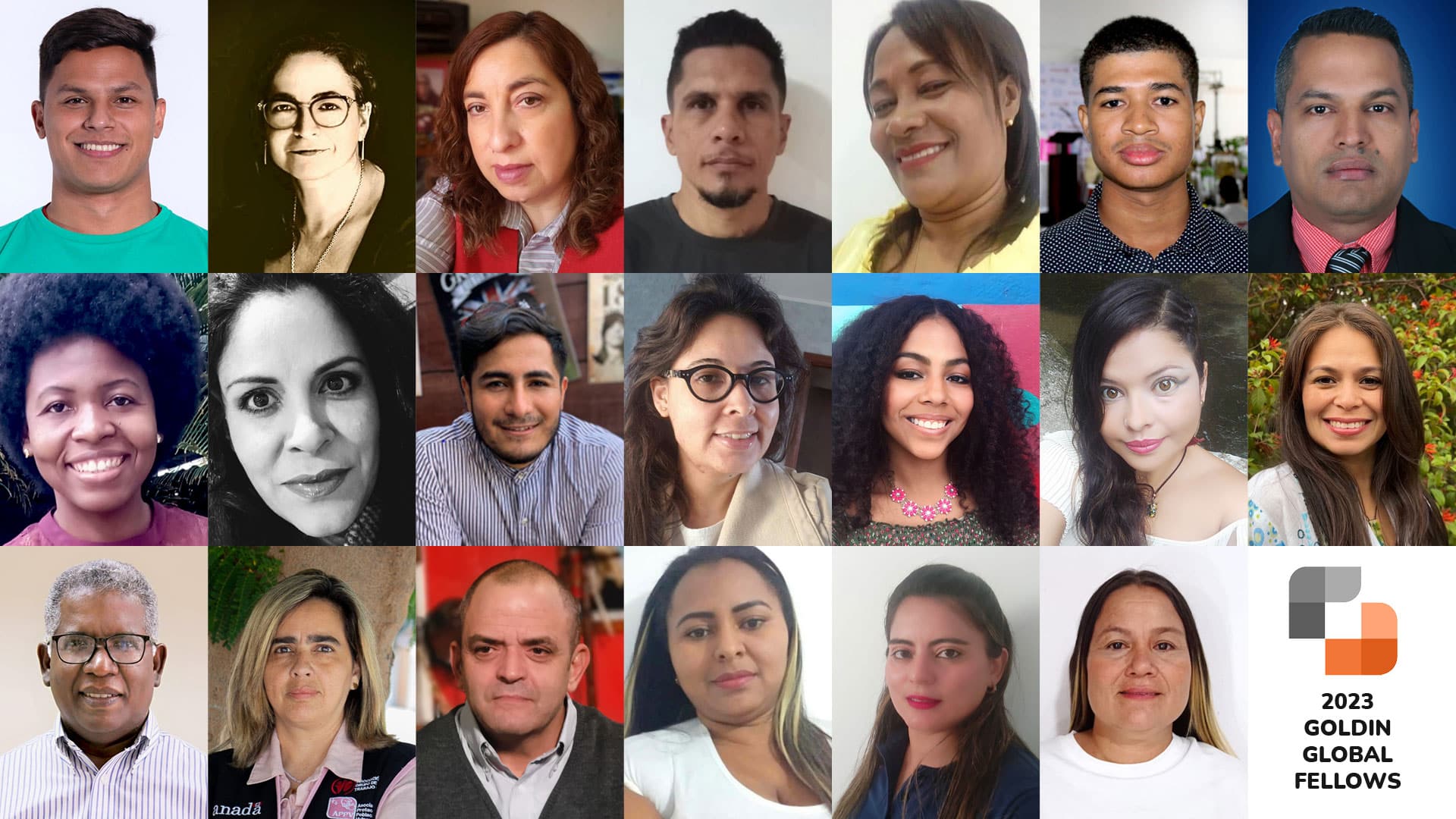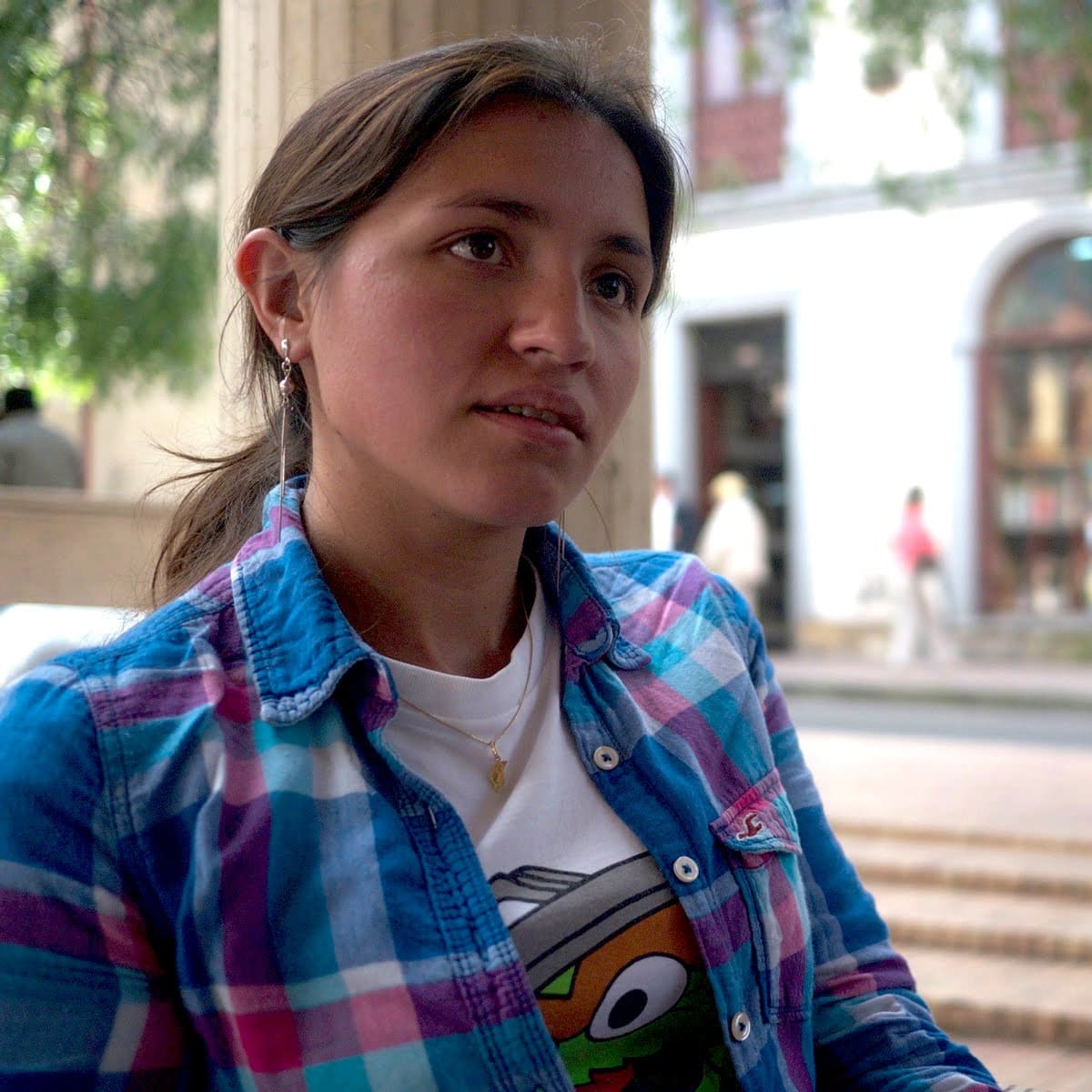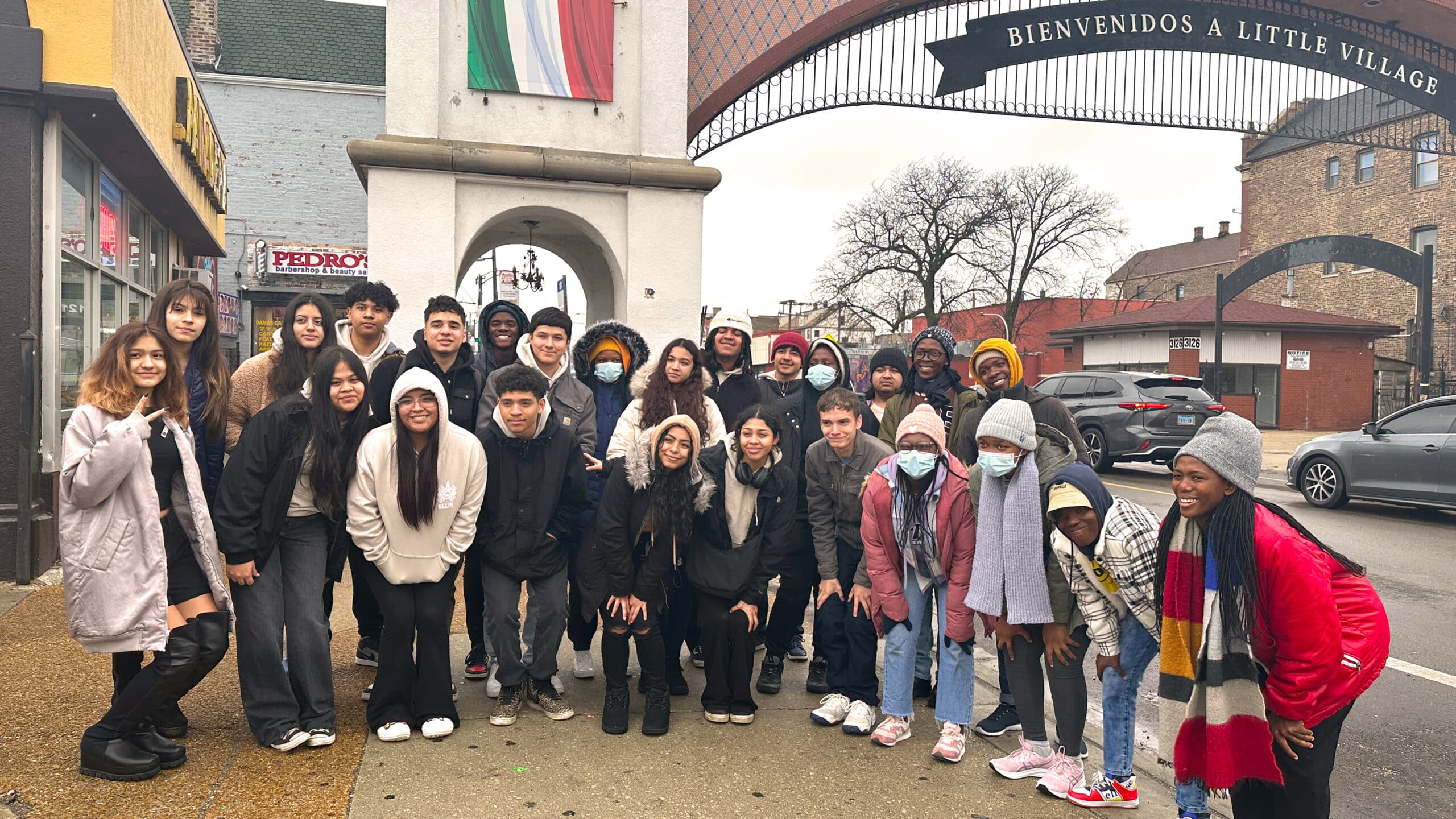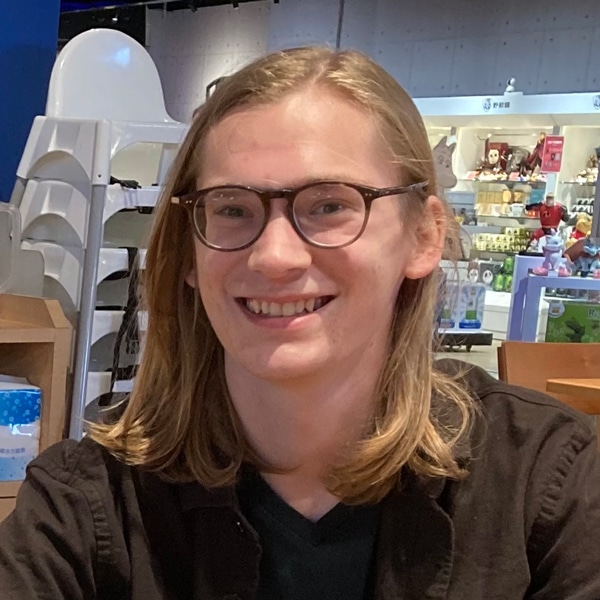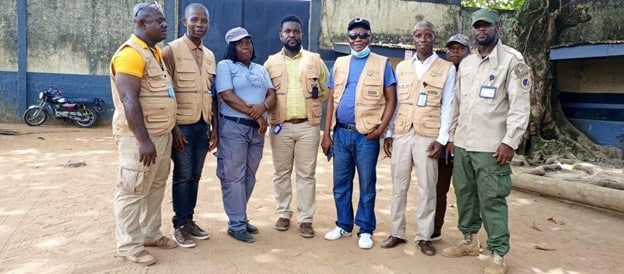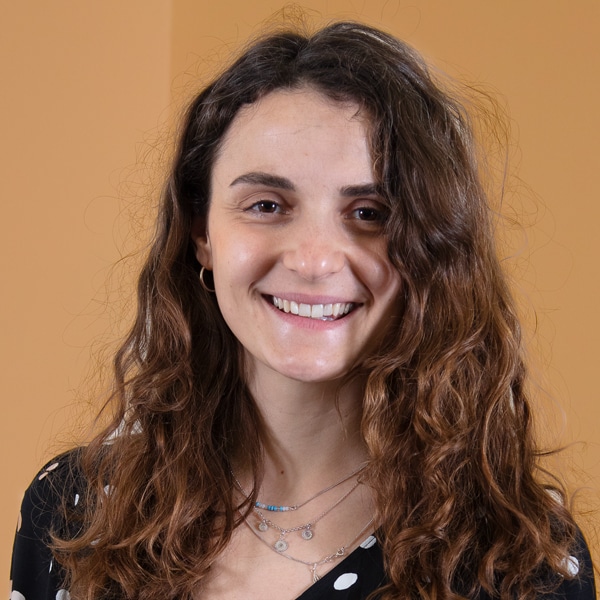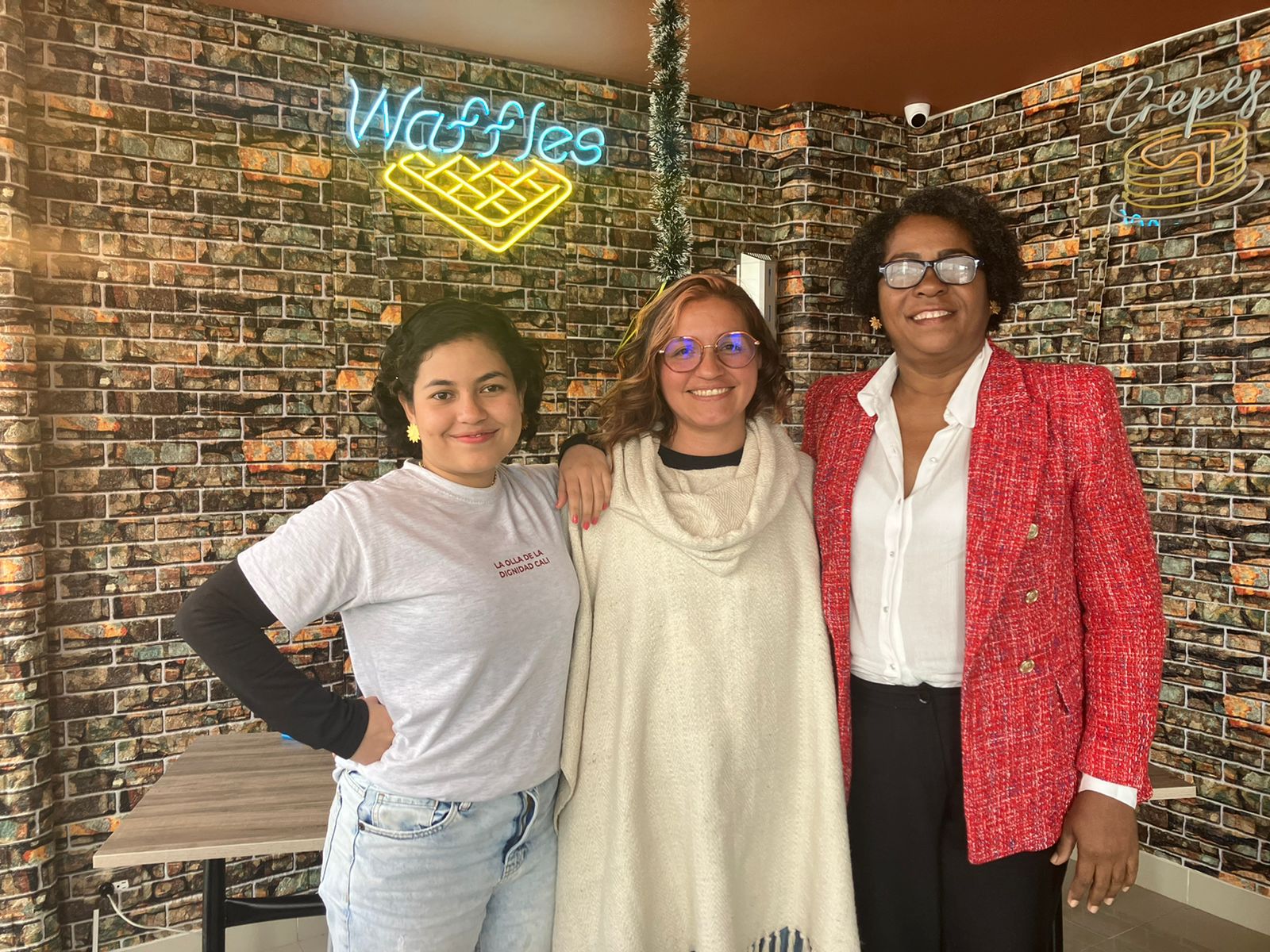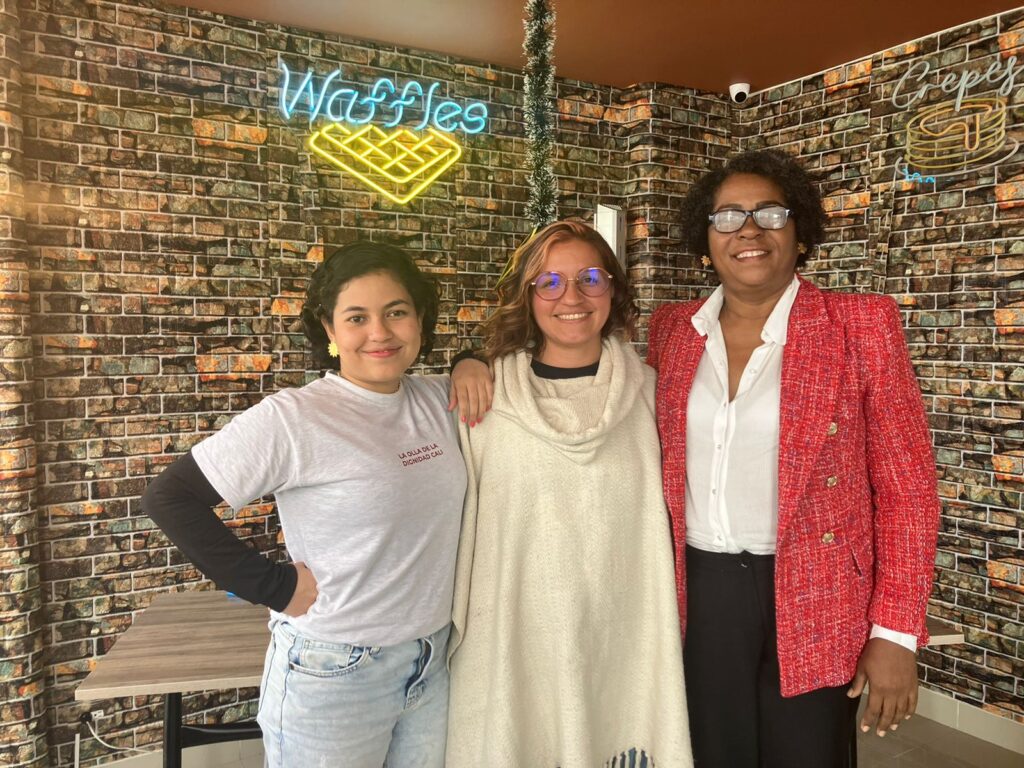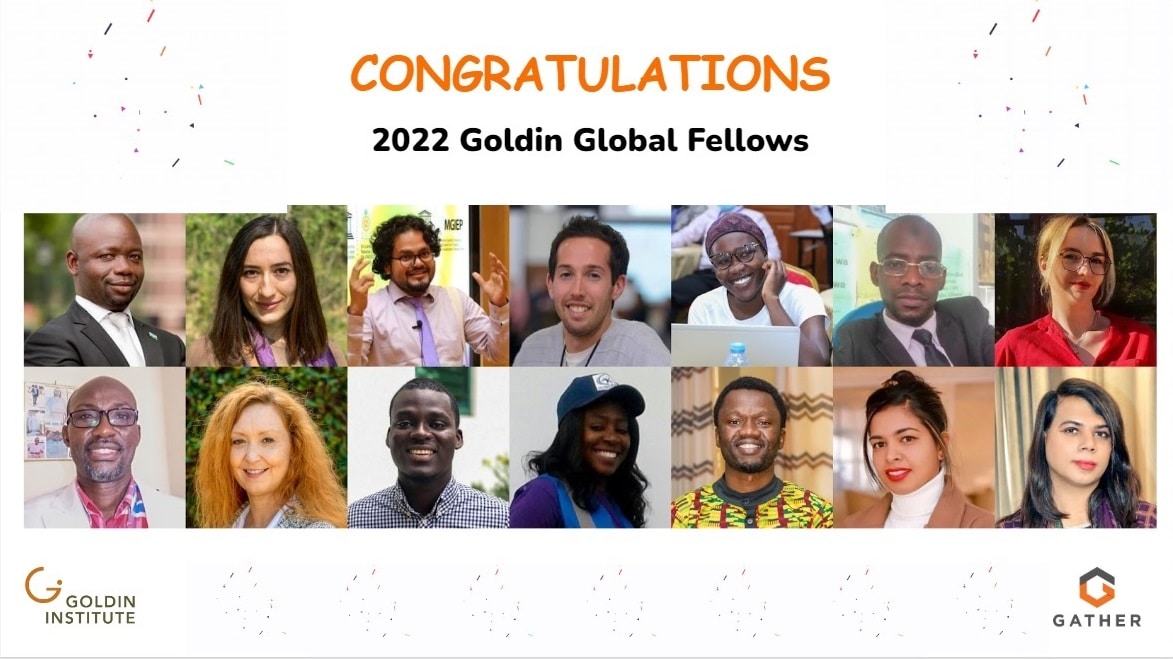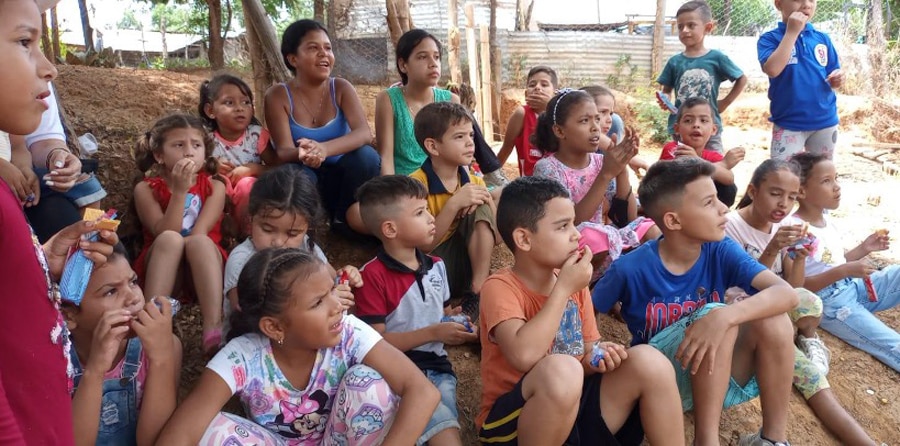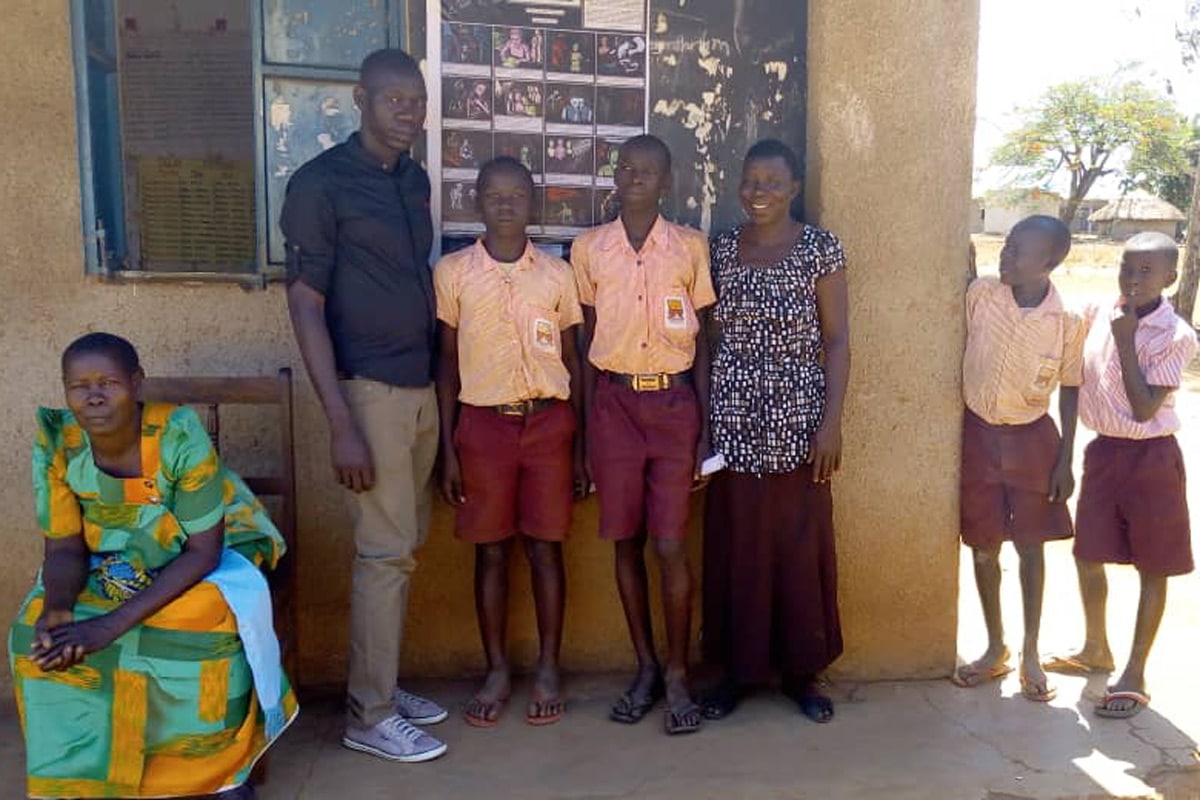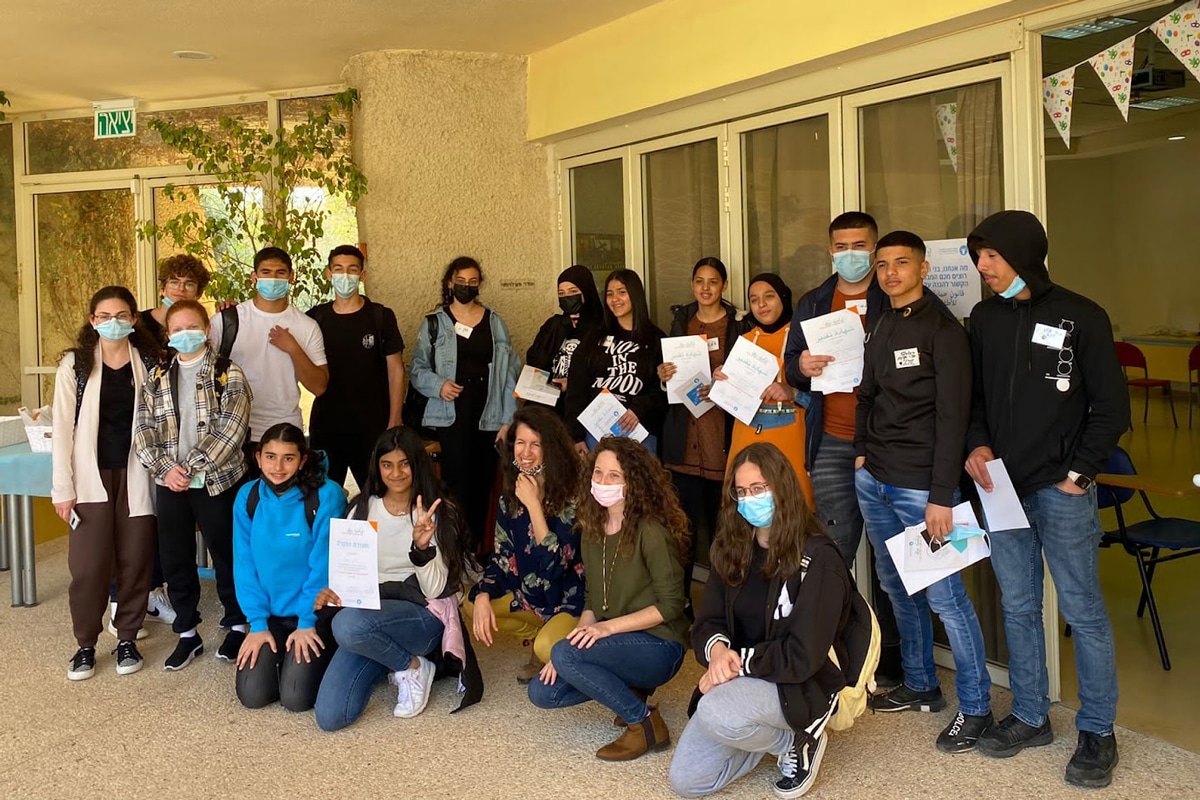Meet the 2023 Goldin Global Fellows Spanish Language Cohort
MEET THE 2023 GOLDIN GLOBAL FELLOWS SPANISH LANGUAGE COHORT
The Goldin Institute is proud to introduce the 2023 Goldin Global Fellows (Spanish Language Edition)!
We invite you to learn about each of the outstanding Goldin Global Fellows who live and work in Chile, Colombia, Cuba, the Dominican Republic, Honduras, Mexico, Panama, Paraguay, Peru, Russia, the United States and Venezuela. This diverse group of fellows will learn and work together as a Community of Practice, building on the talents of their neighbors and the assets of their communities to make real and lasting change around the world.
The idea to have a Global Fellows program for Spanish speakers was suggested by 2018 Global Fellow Lissette Mateus Roa from Colombia who is the lead facilitator for this cohort. Lissette recognized that her home country of Colombia is one of the most dangerous countries to be an activist or social leader, and where solidarity and collaboration with other grassroots leaders and change makers was critical. We are proud to launch our first ever Spanish language cohort to expand the reach of the Goldin Global Fellows community of practice. We are excited to see what the Fellows achieve together.
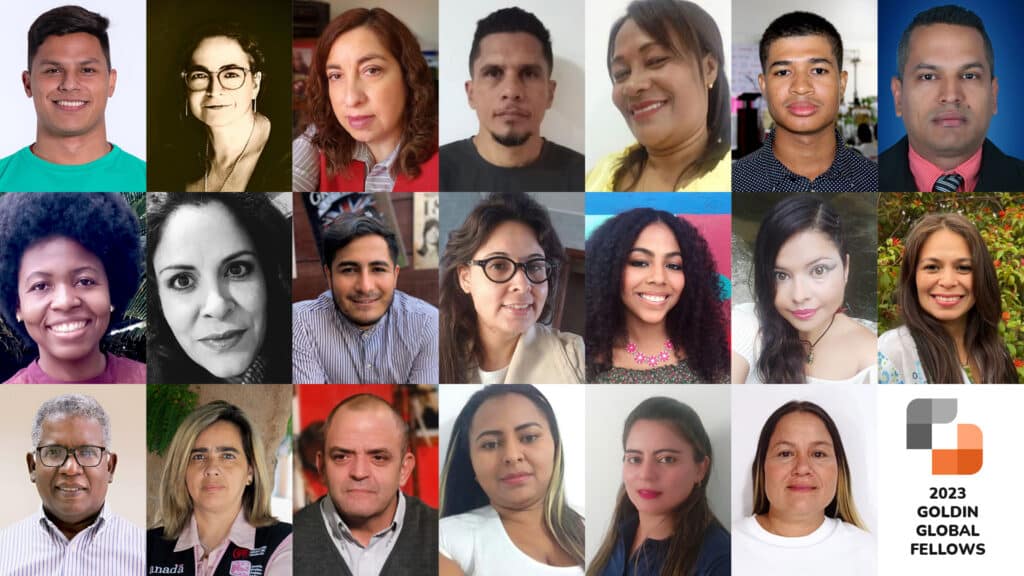
ABOUT GATHER
The Fellows are learning together through GATHER, which is both a mobile platform for shared learning and a curriculum for people who want to build on the talents of their neighbors and the assets of their communities to make real and lasting change. Gather Fellows learn and work together through an innovative curriculum that comes pre-loaded on a tablet device with all the connectivity, materials, videos, practices and tools necessary to provide a mobile classroom and toolkit for community leadership.
The Goldin Global Fellows connects and equips grassroots leaders across the world to lead community driven social change. The 2023 Goldin Global Fellows is the second international Spanish language cohort to utilize the GATHER platform, an online learning hub built by the Goldin Institute to empower grassroots leaders. They will engage in a 22-week course of intensive shared learning as well as group projects, culminating in a graduation event in Fall 2023. The curriculum has been designed and refined in collaboration with the Fellows themselves, based on their practical knowledge and hard earned wisdom, with input from a wide range of civic leaders.
To follow along the learning journey with the Goldin Global Fellows, please sign up for our newsletter and follow up on Twitter, Facebook and Instagram.
Teaching the Importance of Pluralism and Social Inclusion through Robotics
By: Zeki Salah, Communications Associate
A global grassroots robotics initiative, One Team Two Continents, brought thirteen South African students to Chicago in March to participate in a FIRST robotics competition. The project was a joint collaboration between 2019 Chicago Peace Fellow Jackie Moore and 2018 Global Fellow Dieudonne Anumbosi Allo. Funding from the Chicago Peace Fellows Mutual Aid Collaborative and the U.S. Embassy in South Africa enabled the team to provide cultural programming and transportation for the South African students as well as their Chicago robotics team mates.
The Mutual Aid Collaborative consists of 74 Black and Brown leaders and committed allies who live and work in the communities they serve on the South and West sides. They have raised over $100,000 to support several active projects. As an expression of solidarity and support, The Funders Pledge, a project of the Mutual Aid Collaborative, decided to share their funding with the One Team Two Continents team to help cover the local costs of hosting the students.
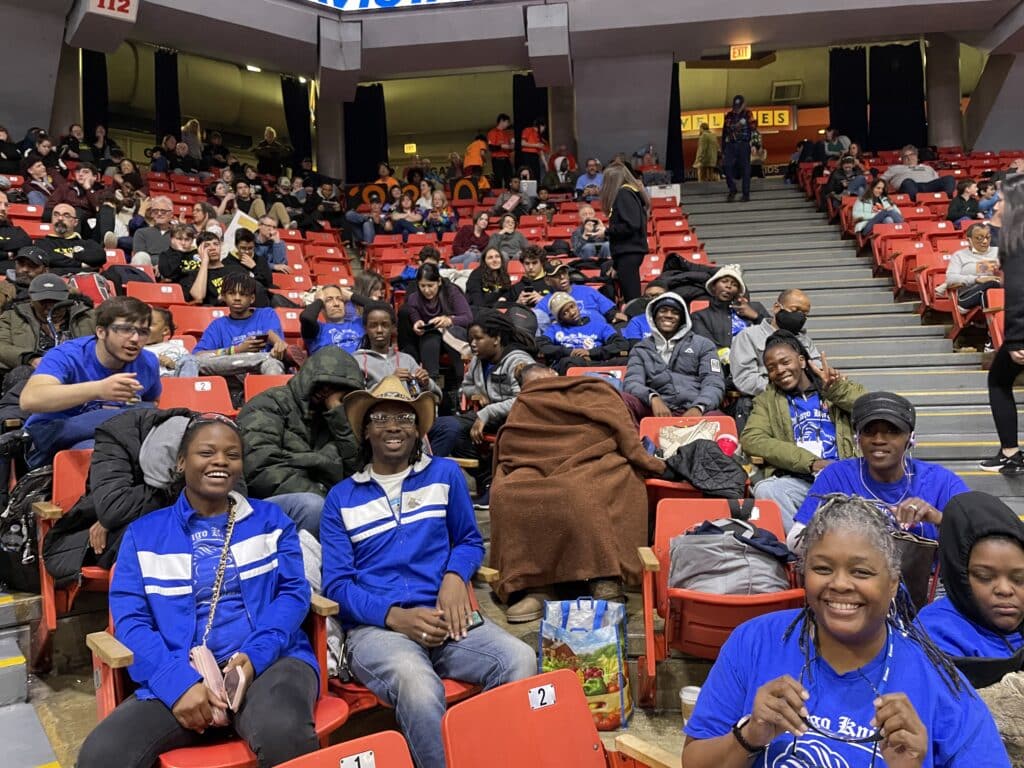
Both Jackie and Dieudonne have experience working with youth in STEM education, making them strong collaborative partners. Dieudonne is the CEO of the Global Leading Light Initiative, a non-profit in South Africa which supports young people in historically disadvantaged communities to acquire future proof skills, with the aim of reducing poverty and inequalities. Jackie is the founder and Executive Director of Agape Werks, Inc, a community based non-profit in Chicago with a mission to promote in young people an appreciation of math, science, technology, and engineering as strategic tools for success regardless of life circumstances.
The partnership between the students in Chicago and Port Alfred dates back to 2019, when Allo and Moore developed the “One Team Two Continents” concept after meeting through the Goldin Global Fellows program to explore cross-continental collaboration opportunities. This initiative envisions a youth-led, distributed team working together on robotics projects in an environment that fosters inclusion and cultural pluralism. The students from both continents convened under the banner of the Chicago Knights, a community based, borderless, and inclusive all-city FIRST Robotics team.
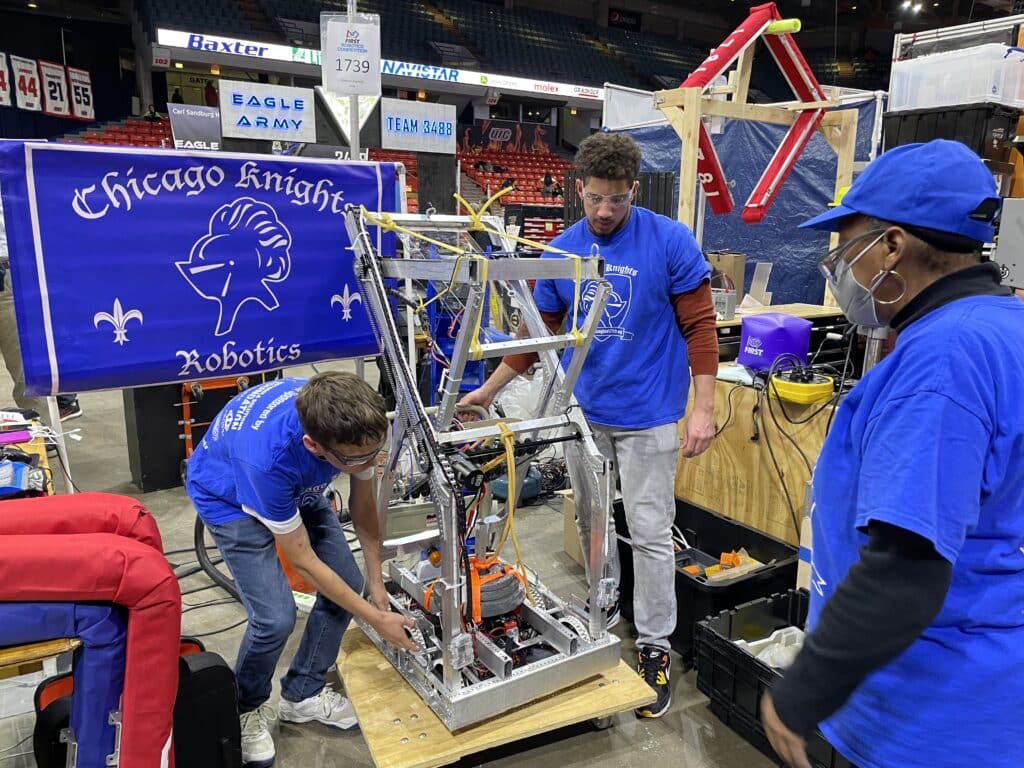
Prior to collaborating with Dieudonne, Jackie had been invited a few times to teach robotics in Uganda and South Africa. These opportunities did not meet her philosophy of teaching, which is to “not to become the expert in the room, but to work collaboratively with someone.”
Soon after Jackie and Dieudonne met, the pandemic hit and remote learning opportunities allowed for the students from South Africa to be involved in collaborative robotics programs. They collaborated remotely for an entire season of robotics competitions. Remote work did have its challenges, Jackie explains, “the way that I typically work really requires a lot of hand-on teaching.” While the virtual environment made it difficult for students to focus, especially in Port Alfred where they often faced the challenge of unstable internet connections and recurring “load shedding”, the students held on and kept coming back for robotics opportunities.
Things changed for the One Team Two Continents team when a grant from the U.S. Embassy's U.S. Mission to South Africa provided funding for students to travel between Chicago and Port Alfred. When applying for the grant, Jackie and Diedonne focused strongly on the fact that the kids from South Africa and Chicago would be working together as one team. Their project proposed to demonstrate the value of pluralism and social inclusion in a robotics environment. This allowed for the teens’ interest in robotics to be placed front and center while showing the value of pluralism and social inclusion through working together as a team.
The exchange between the students in Chicago and the students in Port Alfred went both ways, with the Chicago students having an opportunity to visit South Africa in October of 2022. Together the teammates built small robots and did exercises to develop capacity for working cohesively as a team.
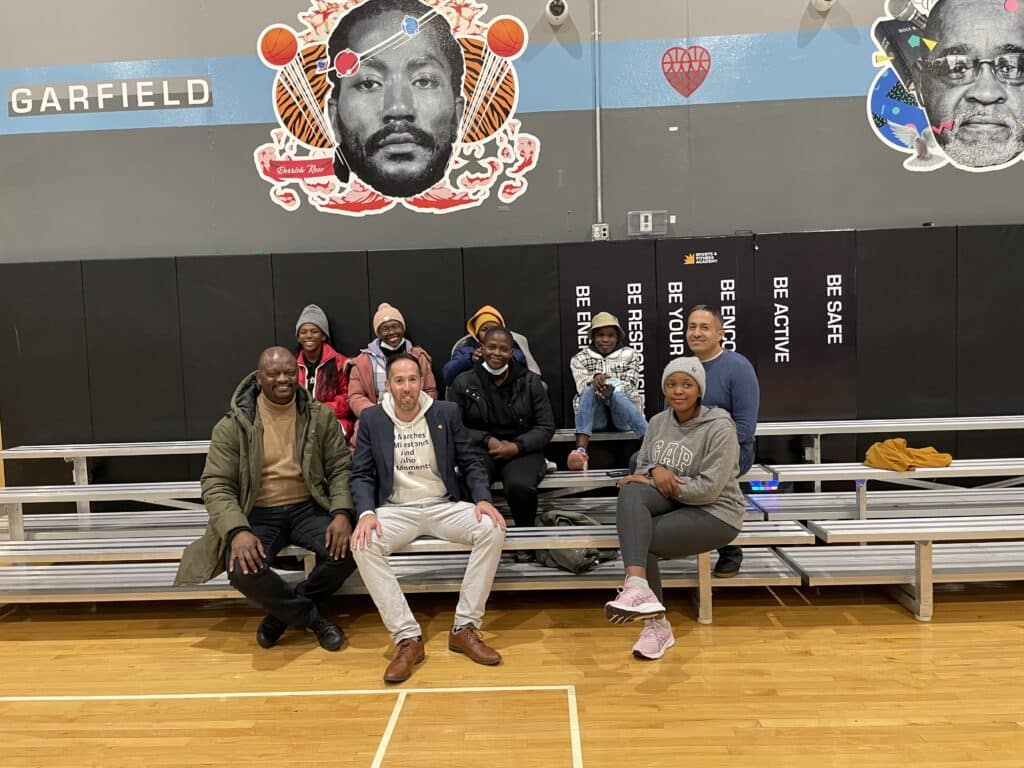
In one meaningful team building exercise, students were able to explore principles and practices of successful collaboration through a soccer game where the rules were altered to reflect the FIRST ecosystem’s values of “coopertition” and “gracious professionalism.” “Coopertition” is the practice of competing cooperatively in which a person will help their competition because the better they both are, the more they can do. In the same vein of competitive compassion,“gracious professionalism” is the idea of competing to the best of one’s ability, but to do it with grace and kindness. These two values harmonize well with Jackie and Dieudonne’s goals of pluralism and social inclusion because they encourage each member of the team to assess one another compassionately so that they can cooperate and work to each members’ strengths.
When the South African teens visited, they were taken on cultural tours of Chicago. These tours included all members of the team and many Chicago members visited places they had never visited. Students went to Little Village, Chinatown, and Robert Lindblom Math & Science Academy in West Englewood. Many of the South African students were surprised to see English as a secondary language in these neighborhoods, with the majority of signs being in Spanish in Little Village or Chinese in Chinatown. This encounter was particularly shocking to the adult South African on the trip who experienced apartheid, when assimilation to a dominant culture was expected. To see distinct Hispanic and Chinese cultural identities existing within a diverse society, and being celebrated by the community as a whole, was a new perspective and an example of the successes of cultural pluralism.
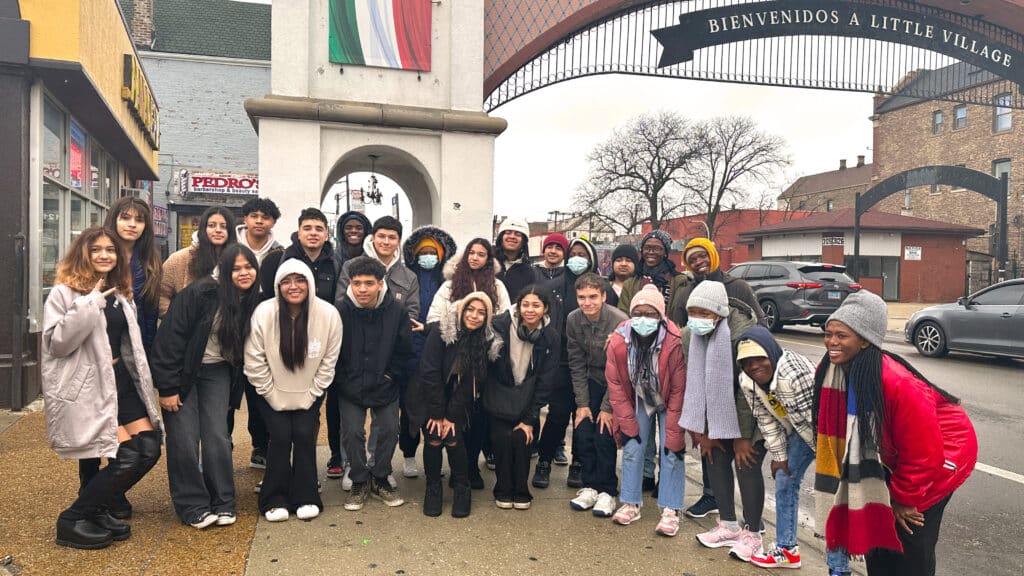
The teens who made up the Chicago Knights were incredibly dedicated to their team’s success, not only traveling internationally to learn robotics, but also sacrificing time from school and extracurriculars. The Chicago students missed Thursday and Friday for the competition, and a week of school to travel to South Africa in October. Hannah was a Chicago student who was new to the team this year. She was not able to travel to South Africa, but she worked consistently before and after the South African team arrived. For the competition, she took a break from her extracurricular activity of playing squash, missing a tournament to meet for robotics. This dedication to robotics helped the team members form close bonds and collaborate with one another and appreciate the diversity of the team.
The rules and guidelines for the FIRST Robotics competition came out in January, giving the team little time to build their robot in preparation. The 2022-2023 season of FIRST competitions was themed FIRST ENERGIZE, with activities encouraging the FIRST community to think about future energy sustainability. This challenge was inspired by the United Nations’ 7th Sustainable Development Goal, which is to ensure access to affordable, reliable, sustainable, and modern energy for all. The team built a mobile robot that was designed to play a custom game designed by FIRST. The robot uses a six-wheeled tank drive and is controlled remotely by a micro-controller called a roboRIO. It has an arm with a manipulator at the end which is composed of rollers that allow it to pick up and launch objects. The students built the entirety of the robot: interpreting drawings, measuring, cutting, drilling, and wiring electronics.
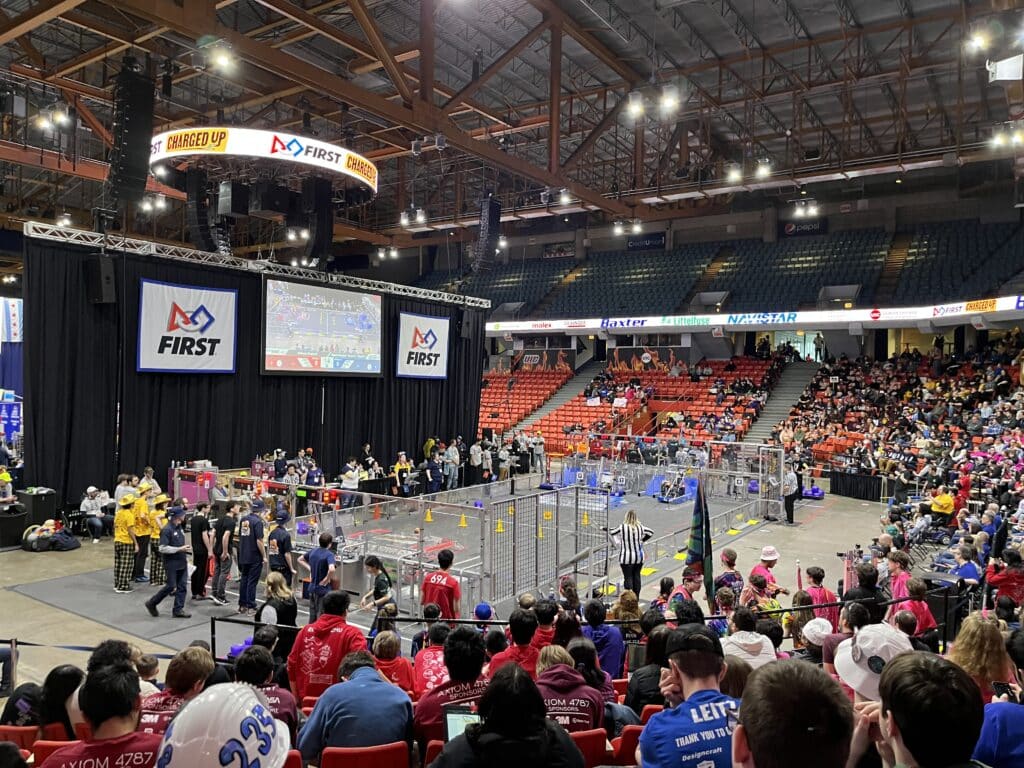
On the field were safety cones and inflatable spheres which needed to be gathered by the robots and moved to appropriate environments. Extra points could be achieved through creating links of particular objects within specific locations or by balancing the robot on an elevated platform with its teammates. Jackie and the Knights understood the game from a social perspective, referring to the manipulated objects as “cone people” and "square people” who could thrive by being placed together in diverse environments as a community which produces points as resources.
The team made an “Every-bot” design shared by the FIRST community which was designed to be accessible and constructible with basic tools. By focusing on the build, the team had a chance to get a lot of hands-on experience building by constructing the entirety of the robot in Chicago. The Chicago side of the team built an initial section of the robot, but when the South African students arrived they got to be a big part of finalizing the robot. Students learned skills and information on the sport to accomplish last-minute aspects of the build in the midst of the competition. One South African student named Litha came in without a great deal of hands-on experience but became a key member of the team working on electronics. She learned from mentors on the Knights and on other teams competing to gain the necessary skills to work on the electronics of the robot. Chicago students also stepped in to teach the South Africans what they had learned from prior builds. Reflecting on the process, Jackie noted, “I guess adversity builds strong bonds. We knew we had a deadline to meet, a very finite time to work on it, and they all worked together.”
Due to the timing of the South Africans arrivals and logistical challenges on the Chicago side, much of the building of the robot took place during the start of the competition. This came at the cost of missing the first day of competing, but provided bonding experiences and a lot of opportunities for the South African team members to gain the hand on building experience that they had been lacking. One student named Jalen, reflected on the building process: “We worked really hard. We would work from 9am-8pm because we had to build a whole robot in a week. We had to work quickly, make as few mistakes as we could, and stay focused.” Despite the rushed building process, the teens were very excited to participate in the competition and all came together to cheer when their robot made it to the competition floor.
As the teens on the Chicago Knights competed in the FIRST competition, they realized that cooperation was an essential part of the tournament. Many Chicago students went out of their way to teach South African students, who had limited experience building. For instance, Jalen was referred to as the “rivet master” for teaching the rest of the students how to use a rivet gun. Not only did teammates assist each other, but they were also helped by other teams. As the Knights crunched to build their robot, they were assisted by students from Lindblom to machine a ventilation pipe. Reflecting on her favorite memories working on the project, one student named Hannah reflected, “Cheering for our team at the competition was my favorite part. But we also got to go around and take pictures with other teams [...] I was shy to speak to other teams, but they were really nice and let me take pictures with them and their robots.” From start to finish, the FIRST competition was as much about compassion and collaboration as it was about competition, making it an excellent environment for cultural and intellectual exchange.
Promoting Justice for Detainees in Liberia
By John Kamma, Global Fellow from Liberia
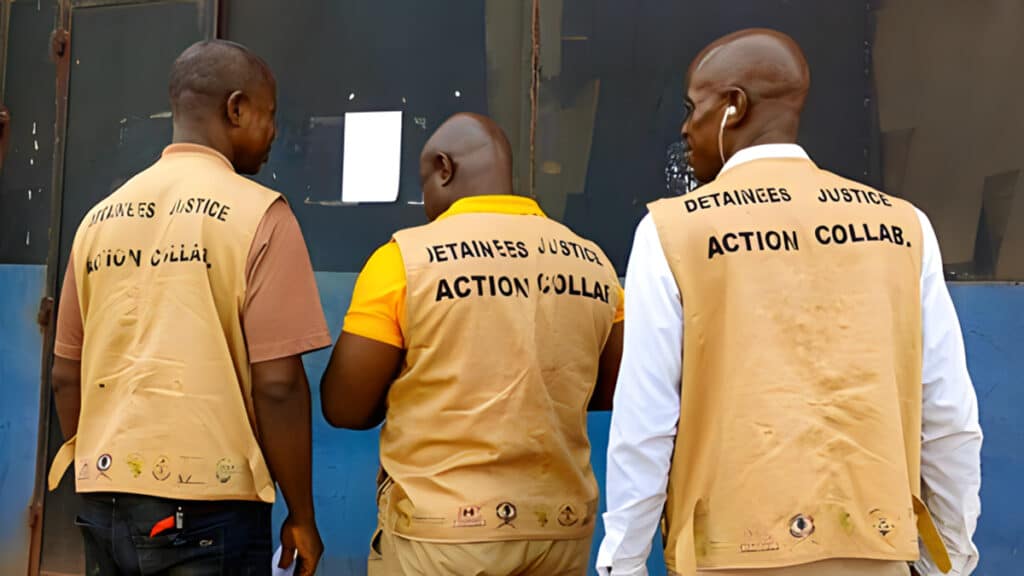
It is with great joy that I announce that I have won a €10,000 Euro grant from Catalyst 2030 to pilot a project focused on detainees in Liberia. I have already secured a permit from the Ministry of Justice to visit prisons and start working with detainees to review their cases. Together, with my local learning partners and the advocates, we will identify detainees whose rights have been violated and provide legal support to facilitate access to those rights.
“Today, we visited the Monrovia Central Prison and interacted with Prison authorities who were very pleased about our intervention to bring justice to the life of pre-trial detainees. This is a step toward our data collection process that will be used to advance evidence-based advocacy, demanding due process of law for pre-trial detainees in a competent court of jurisdiction.”—John Kamma
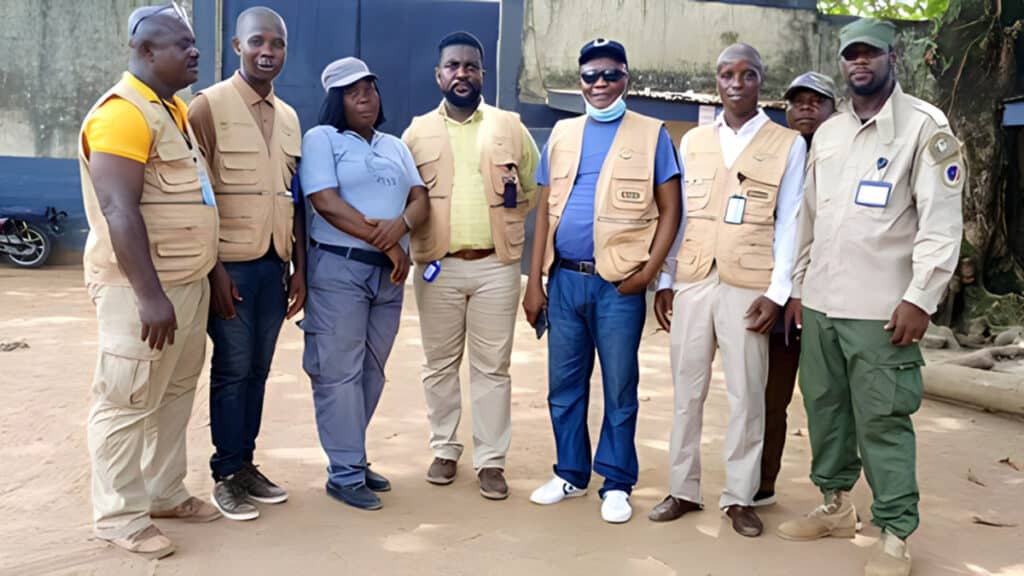
The project, Detainees Justice Action (DJA), seeks to; promote access to justice among detainees, support their integration back into the community, and provide sustained mental health support. We just started in Monrovia but the permit from the Ministry of Justice allows our project to scale across the country. The three-month pilot phase is now focusing on the identification of detainees whose legal rights were not met. Afterwards, we hope to start addressing the issues in court with support from the advocates.
Between June and December 2022, I was engaged in an extensive training program led by the African Civic Engagement Academy (ACEA). During that period, I had an opportunity to learn with over 2,000 participants coming from across the African continent. I applied for this opportunity because I understand that our work in the community requires constant learning, research, and networking. Throughout the program, I was exposed to knowledge about basic principles of civic engagement, inclusion, media management, non-profit management, and program design.
The whole program was conducted online, featuring multimedia content designed to expose us to different theories. I also learned a lot about practical applications from other participants. We exchanged experiences based on our unique actions in our respective communities. I was particularly impressed with the lessons surrounding the need for partnerships and collaborations. We learned that extending partnerships with the government and other civil Society Organizations can increase our chances of success in tackling the issues we face.
“Ensuring that the government does not see you as an obstacle is key to improving relationships, obtaining support, and achieving collective goals. Sometimes the government already possesses important information that is necessary for our work to be successful.” — John Kamma
Last year I was training at the African Civic Engagement Academy and whilst there I submitted a Civic Engagement Action plan detailing the work of Detainees Justice Action. This led to my recent invitation to attend the 2023 ACEA Summit which takes place tentatively on March 17-19 in Nairobi. I am so glad for this opportunity and I’m looking forward to it.
“The reviewers at ACEA selected me for the Summit because they were impressed with the quality of my Civic Engagement Action Plan and with my participation in the ACEA training last year.” —John Kamma
How Ibali Lam is Empowering Women Entrepreneurs in South Africa
To mark this year’s International Women’s Day, the UN has chosen the theme of Technology and Innovation for Gender Equality – an area familiar to Dieudonne Allo (Global Fellow from South Africa) who is leading the Ibali Lam program through his organization Global Leading Light Initiatives. Ibali Lam is an exceptional example of empowering women through technology, by providing women entrepreneurs the digital tools and innovative approaches to storytelling to connect with existing and new customers and investors.
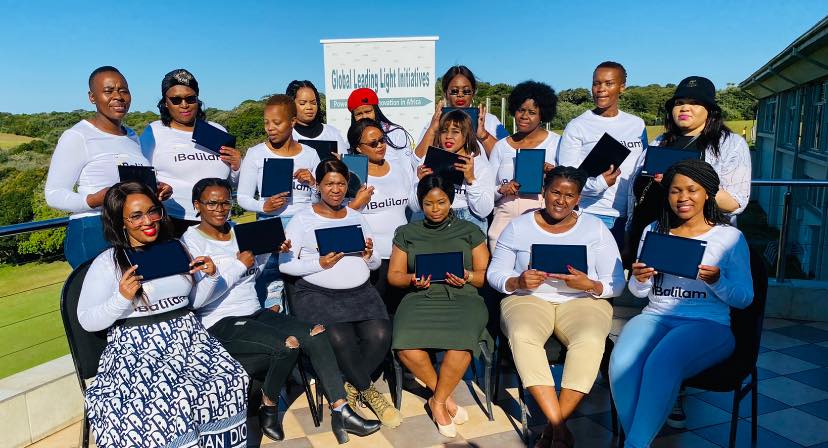
The project uses business storytelling, frugal innovation, investment readiness, and networking to help women whose businesses have been affected by COVID-19 to pivot new online models and engage existing and new audiences. The program also offers weekly roundtable sessions and one-on-one-coaching.
To mark International Women's Day, Global Fellow and CEO of Global Leading Light Initiatives Dieudonne Allo and Program Coordinator at Global Leading Light Initiatives Fatima Momoti share their insights on how their Ibali Lam program is improving women's lives, mainly through economic empowerment.
Marking International Women's Day
Fatima begins by elaborating on how women in today's world cannot interact without technology and storytelling.
“We need to empower ourselves with technology. If we are not going to move with the wave of technology, we will unfortunately get left behind and be stuck in that mentality of a previously disadvantaged group. Women need to be more in the forefront of development and innovation.”
She further elaborates on how the Ibali Lam initiative lifts women to achieve this.
"We are mainly in a rural area, so for these women to have a wider reach increases their income for their business. We come from setups that mainly have four to five people in a house, so having extra revenue means they can feed themselves and their families."
According to Fatima, when women beneficiaries understand what storytelling is they are able to better understand their customers and better craft their business online by using various social media platforms.
"Another component of the program is to ensure that we have a more holistic approach in helping these businesses accelerate and then from there help to set up the business aspect, the digital transformation."
Then, through investment readiness, women are introduced to potential investors.
"Women have been mainly talking to customers, and now it's changing from that to a potential investor. So, they get into that space when they can pitch to investors and get feedback."
This leads to more opportunities and stability for them.
Dieudonne places emphasis on women’s economic empowerment and its core role in the Ibali Lam program and importance for social justice
"Technology is advancing today, and every woman must empower herself to bridge the gap. Technology is a potent tool for women to transform themselves and empower themselves economically, because Ibali Lam is really about economic empowerment" -- Dieudonne Allo, Global Fellow from South Africa.
Gather as an Inspirational Path
Dieudonne highlights that Ibali Lam drew inspiration from the Goldin Institute’s GATHER program.
"The Gather program of Goldin Institute inspired the model of Ibali Lam. Women, especially in this part of the world, do not have access to technology, so we give them access; we provide internet data to them so they can access the online platform. Women get tablets, too.” he says.
Today, Dieudonne adds, one cannot interact without technology.
“Another thing without which you cannot interact is storytelling. For us, as Africans, storytelling is a very vital part of our culture. So, combining storytelling and technology women can connect to people and make them see value in their outputs and businesses.”
Ibali Lam’s Future Projects
Ibali Lam has to date supported 37 women and will continue to support women in other forms too. Concluding our conversation on a positive note, Dieudonne shares that they are working on a new project which will launch soon.
"Working with women, we can equip them with technological tools and their businesses can go online, but if they do not have access to finances, they cannot grow their businesses."
So, to support them, Ibali Lam has developed a new support program that will provide micro-grants for its alum. Follow Ibali Lam's work through their website.
Celebrating the Graduation of the 2022 Goldin Global Fellows Spanish Cohort
Creating an accessible leadership program for Spanish-speaking grassroots leaders
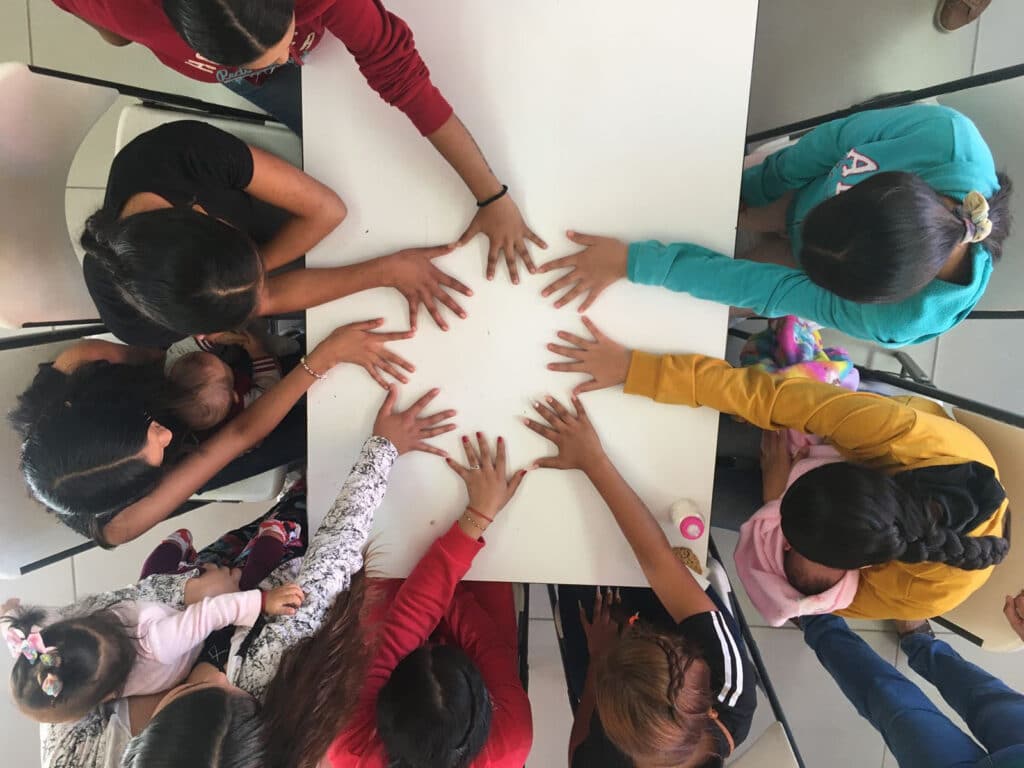
On December 10th we celebrated the graduation of the first Goldin Global Fellows program in Spanish language, where 17 Spanish-speaking grassroots leaders from eight countries in Latin America and Europe came together to create a new community of practice.
Since 2018, we've held onto the dream of offering the Fellows program in Spanish. True to Goldin Institute’s principles of ensuring that resources and connections are accessible to as many grassroots communities around the world as possible, offering the program in Spanish has long a priority for our whole team. Removing language barriers -- which included translating the curriculum, readings and videos in the GATHER Platform from English to Spanish -- was not an easy process. But I can say the effort to offer this course in Spanish has been worthwhile, especially for me as a Spanish-speaking activist who has been able to find a community who speaks in my native tongue and who are also working on both similar and different issues.
“Gather is knowledge and collective construction.” -- Luis Alomia, Colombia
During the recruitment process we counted on our Alumni, friends and colleagues from Colombia and Latin American countries to help us share the news of the application and spread the word. We were delighted to receive applications from a diverse group of grassroots leaders from over 10 countries that crossed many divides in our society, bring together youth and elders, leaders from rural places and main cities, victims of violence and former combatants. Together, these individuals represented a wide range of sectors, including environment, law, education, technology, peace and reconciliation, arts, memory, sports, theater, and more.
“Gather is a before and after of my leadership. I am happy since they contributed to broaden my vision and knowledge that will help me to build solutions that can be lasting over time and see communities as a treasure of active resources and that will be an example of good practices for other communities that want to join the transformation”. -- Natasha Duque Torres, Venezuela
It was truly a very diverse group, each doing beautiful work individually, but tied together by the common bond of being leaders on the front lines where life revolves around changing their communities and finding solutions every day. From these applicants, we selected 17 individuals who became the first Spanish-speaking cohort.
As a facilitator I was impressed when talking with our Fellows about the learnings and concepts delivered in the program, and realized how their perspectives and ideas about their community and social-change work had begun to develop and adapt. Indeed, they became more aware that new solutions had to be based on all the assets they always had but may not have seen in their communities. It was also moving to see how they started imaging a new understanding of leadership which counts on the whole community, giving opportunities to those often left behind. I was further impressed at how sensitive they became; in our conversations we sometimes cried noticing the changes they were going through and how new concepts gave them a vision of collectiveness.
"Gather has allowed me to broaden my horizons as a social leader by identifying and valuing resources and assets that we have as a community, as well as empowering the leadership of my colleagues based on the recognition of their individual strengths and interests in community work." -- Diana Rocio Gomez Torres, Argentina
Fellows felt that the course on the GATHER Platform was different from other courses because they had a strong sense of support from the Goldin Institute team and meaningful relationships with their peers.
It’s like a family that we can always count on, no matter what.
In our roundtable “Reflections and Critical Moments” one of the most broadly shared reflection was that the Fellows felt like they were not alone in this program, knowing there were other leaders around the world doing the same and learning alongside them. For example, Ernst from Haiti would tell us about the challenging times facing the Haitian population due to the political situation in his country, or Eva in Argentina would share that she faced many struggles for raising her voice against state violence. We also exchanged positive and happy stories too, for example Manuella shared about her journey from Quibdo (Colombia) to Spain to talk about how successful her project about football was there, or Nuria from México who got to be involved in a project to protect underage pregnant girls. We also had Martha from Guapi (Colombia) who graduated from her specialization during the Fellows program and Arturo from Bogota (Colombia) and his “Picaditos” Football matches with youth when they launched their book “La Prisión que Jamás me Contuvo” written by a former combatant. All of us looked forward to meeting each Saturday where we shared beautiful moments with each other during our weekly GATHER Roundtables.
“Gather is a seedbed in which the strengths, abilities and natural gifts of leaderships are brought out.” -- Geiner Arrieta, Colombia
So when the Program came to an end, Fellows wanted their graduation to be like a party; a celebration of life, cultures, learnings, our individuality and how this makes sense in community. Fellows celebrated with drinks from their territories, showing off their typical customs or any other item that represented them. We also had a freestyle performance by Johnathan, and a video of some musicians and dancers from the region where one of our youngest fellows, Luis Alomia, is from.
“My Gather experience has helped me to see that the actor of change that I want to be requires the participation of everyone in my community. Having grown up in a society where exclusion is the norm, Goldin has given me the necessary tools to be a true agent of change by collaborating with others and identifying our resources to be able to dream big together”. -- Ernst Djeride, Haiti
I have to say the best part of the celebration was the desire of Fellows to talk about the future and their optimism for new collective projects. They want to move forward, grow, and build together. Fellows Manuela and Arturo proposed four lines of work for Fellows in 2023:
-
- Creating a shared asset map with the purpose to realize a meeting of sharing vision. To have it real, we need a plan to know what we have, what can we do to meet us face to face together and develop our community visioning summit.
- Monthly meetings where each person of this cohort can lead one of the meetings.
- A directory of all the members of the Alumni network with their strengths and special topics and projects where they work.
- Participate in all the workshops set up by the Goldin Institute so we can learn, meeting new people and collaborate in new projects.
- We can share our networks, follow each other, and get to know what each one is doing, as well as and distribute what others are doing, including Goldin Institute’s social networks.
- We need help from the Goldin Institute to present our projects in case we need representation.
"Gather has given me the chance to meet my community again, open up to new listening, in order to collaborate on the paths we are charting together”. -- Nora Gabriela Fuentealba Rivas, Chile
And now, Fellows faithful to the principles they learned during the Goldin Global Fellows program wanted to remove barriers of distance so some of them made the efforts to meet with each other in person!
“As you may know this is the 20th birthday of Goldin Institute and I can’t think of a better way to celebrate our 20th anniversary than by welcoming you into our Global Family, congratulations to all of our new graduates on behalf of the Goldin Institute, and especially, on behalf of Diane Goldin, the Founder and Board chair of the organization.” - Travis Rejman, Executive Director of the Goldin Institute
Our 2022 Global Fellow graduates are stronger together
By Yusuph Masanja, Co-Facilitator of the Global Alumni Network

Since the inaugural cohort of the Goldin Global Fellows in 2018, the Goldin Institute has evolved the GATHER curriculum to remove barriers to access for grassroots leaders and to augment the pedagogy to work for the realities of our Fellows across the globe. One such development was the ability for Fellows to access the curriculum not only on iPads but on any internet-enabled device or smart phone which is most convenient for them. This change removes a significant barrier for Fellows who reside in remote places and lack reliable access to electricity, wifi and the latest gadget or repair services.
As a Facilitator of the program, our intentionality in removing barriers is why I am such an advocate of the GATHER approach. It is how our network of Alumni has grown to 150 Fellows from diverse backgrounds, including those leaders who are often left out of conferences or trainings, who now hail from over 40 countries. And we are confidently making space for more grassroots leaders to join us. The Community of Practice that Fellows continue to build, one cohort at a time, is proof that building change from the assets we have is a path to meaningful and inclusive progress.
This year we saw our third cohort of Fellows embark on the Global Fellows Program. The 2022 Goldin Global Fellows are 14 bold and wise grassroots leaders from across the globe, including Cote d'Ivoire, North Macedonia, the USA, Ghana, Nigeria, Zimbabwe, Nepal, Pakistan, Malawi, Bangladesh, Albania, Sierra Leone, and Kenya. Amidst our diversity, we are united by the desire to learn, reflect and implement proven ideas for community-driven social change in our respective countries.
At the graduation ceremony on 4th November, the 2022 Fellows demonstrated their achievements and shared their aspirations. The ceremony began with a message to all Fellows from the Founder and Board Chair of the institute, Diane Goldin who warmly welcomed the new Fellows to the network:
“I could not be more honored to have the opportunity to know so many talented leaders and know the innovative results. My congratulations for all your work in achieving your goals and for being a part of our global family. You are appreciated and loved.” - Diane Goldin
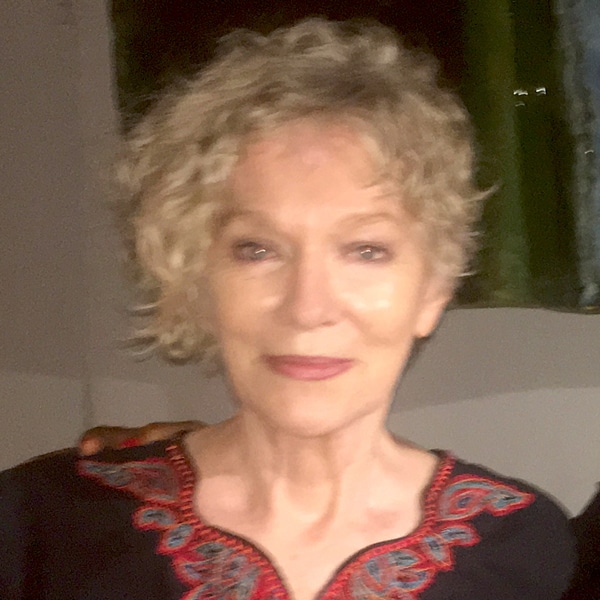
At the graduation, Fellows shared moving testimonies of how their five months through the program transformed their worldviews, their grassroots activism, and brought new friends into their lives. As a Facilitator, this feedback is so rewarding, which keeps me motivated to expand the opportunity for even more community leaders around the world. Here are a few quotes from some Fellows captured from the graduation ceremony:
"The process of assets mapping where we identified people, institutions, connections -- and all things which give us life in our communities -- helped us to see the abundance of resources that can be tapped to make progress." - Abdul Rahman Kowa from Sierra Leone.
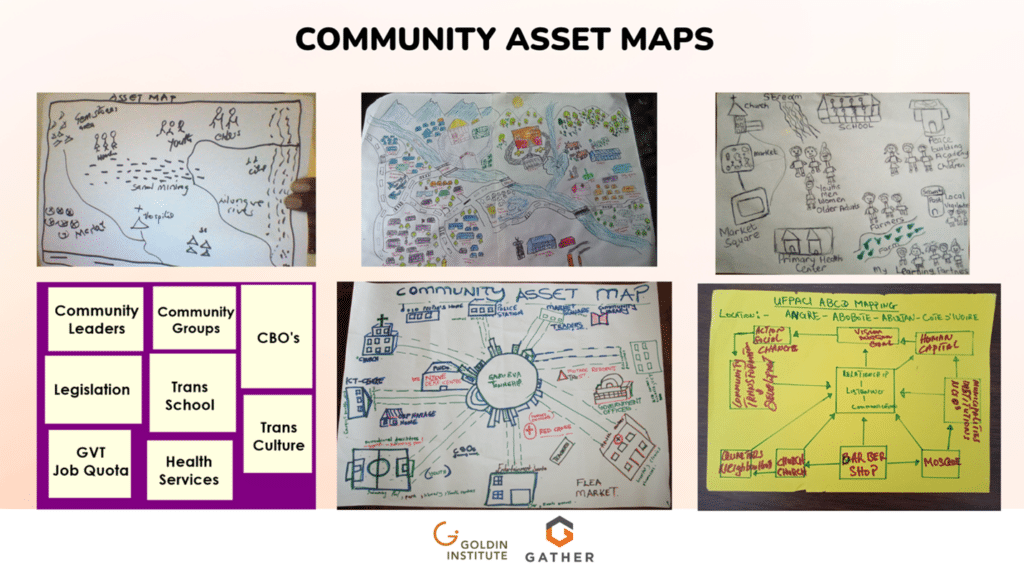
Florence Adhiambo from Kenya shared a great insight from what she learned during the program:
"The GATHER curriculum reminded me that leadership is not a position, but rather a commitment to building partnerships and trust with our fellow community members where everyone is aware that everyone has something to contribute."
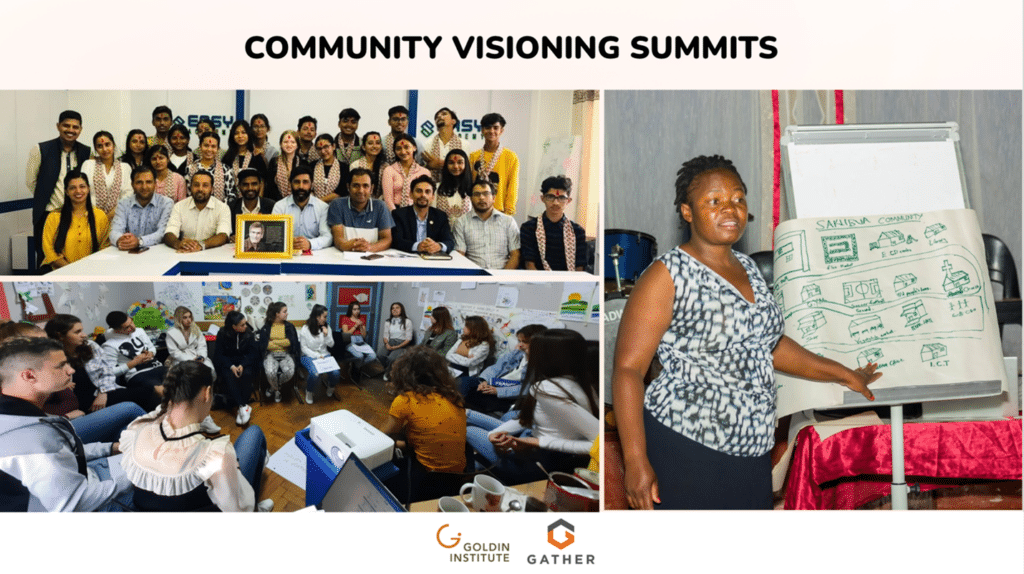
A key element of the curriculum on the GATHER Platform is the hosting of Community Visioning Summits; these allowed Fellows to share assets they have identified with broader community members, and to use appreciative inquiry to discover aspirations and shared priorities with the community. Central to the GATHER curriculum is the capacity for grassroots leaders to involve the voices of those most often left out in regular community processes and actively remove barriers to full participation.
In addition to sharing what they learned, Fellows shared key aspirations and next steps for how to collaborate with neighbors and global peers. In one example, Global Fellow Klementina Dobrevska from North Macedonia shared her next steps for addressing the issue of bullying and violence in schools:
Students who have disabilities are faced with a lot of pressure and bullying. Now we are working to promote children’s rights. So far, we have 500 students on board and in our second Community Visioning Summit we managed to leverage a new tool for youth participation which will allow us to get students’ opinions across the country.
As a final step in the Program, all Fellows partnered with their community members to develop a vision and outline next steps they will take to bring these aspirations to their respective countries. We will be sharing Fellows progress with you in the second edition of this article so that you can better understand and support their efforts. We believe everyone can make a difference no matter how small!
In addition to Fellows sharing their wisdom during the ceremony, they also performed poems, and songs, and led a candlelight ceremony. You can watch the entire recording of the graduation ceremony here.
Before closing, our Executive Director Travis Rejman, virtually presented the Graduation Certificates to each Fellow recognizing their successful completion of the GATHER curriculum and invited them to the Global Alumni Network. Staff members shared their messages of congratulations for the Fellows and Travis Rejman closed the ceremony with the following remarks:
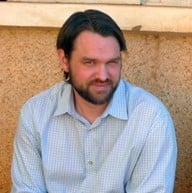
“It’s been an honor to learn together with you over these past 20 weeks. Over the last 20 years, we have been inspiring, connecting, and equipping grassroots leaders around the world so that they can learn from each other and work together to tackle really tough issues that all of our communities are facing. This celebration is a perfect example of what this work looks like in the real world. Thank you all for your dedication and hard work. We are very proud to stand with you and celebrate your accomplishments. We are very excited to welcome you into our global family.” — Travis Rejman.
Flooding in Nigeria Impacts Millions
by Oluchi Achi Uzodimma, 2022 Goldin Global Fellow, Nigeria
Nigeria experienced its worst flooding in a decade this October, resulting in the deaths of at least 600 people. More than 2 million people and 200,000 homes have been affected by the severe floods, according to Nigeria’s humanitarian affairs ministry.
Communities along the River Niger and River Benue have been particularly impacted as water levels rose up to 13 metres, with homes and public buildings inundated. The floods have had wide-ranging effects –from food insecurity to fuel shortages.
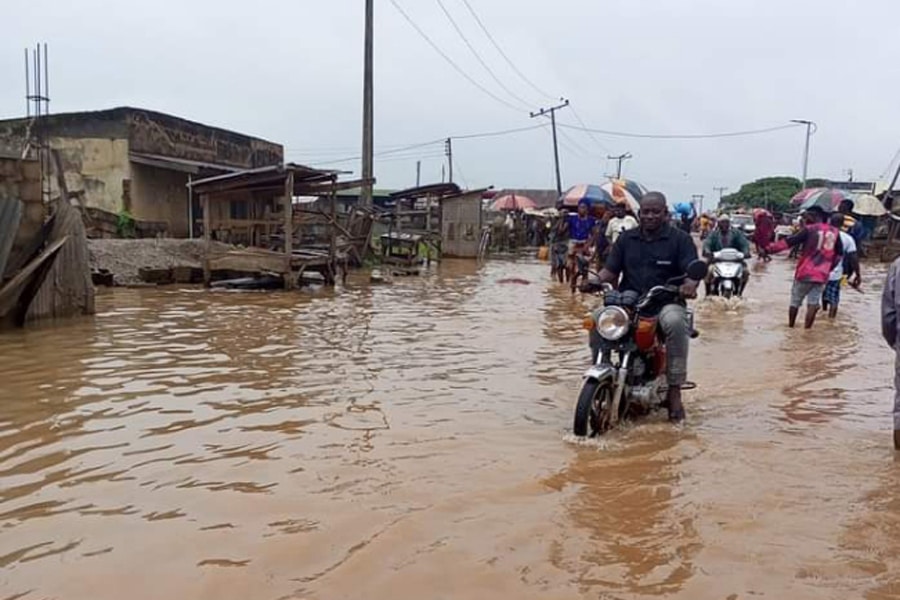
Flood menace in Nigeria has become a normal and re-occurring phenomenon which can have devastating impacts on human livelihoods and infrastructural development. Causes of this problem are both local and global; local factors include population density , poor governance, poor drainage facilities and decaying infrastructures and lack of proper environmental planning and management strategies.
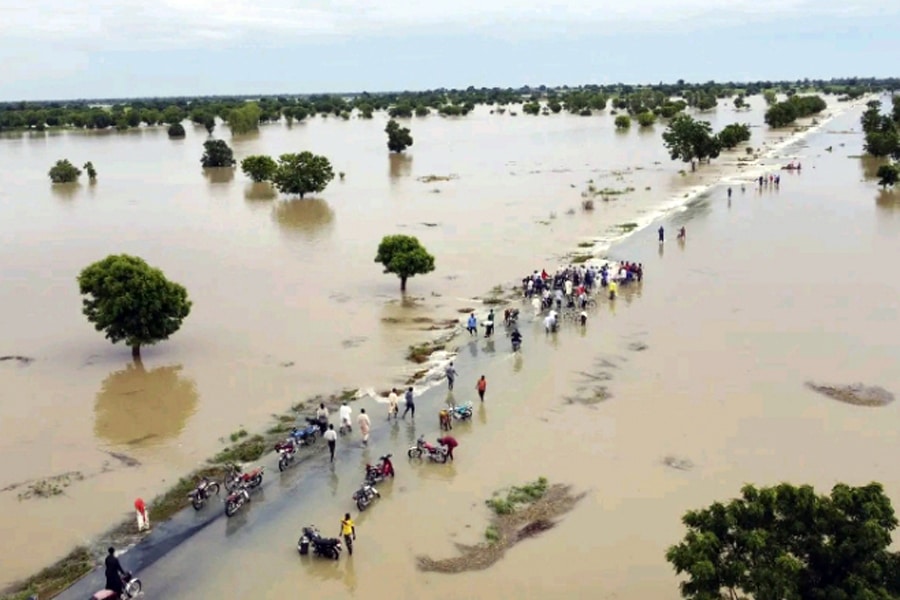
On a global scale, climate change and environmental catastrophes, as well as unsustainable human and technological endeavors, have accelerated and amplified the rate of such disasters. The consequences of which see the spread of diseases, loss of thousands of lives from various parts of the country, and properties and homes destroyed.
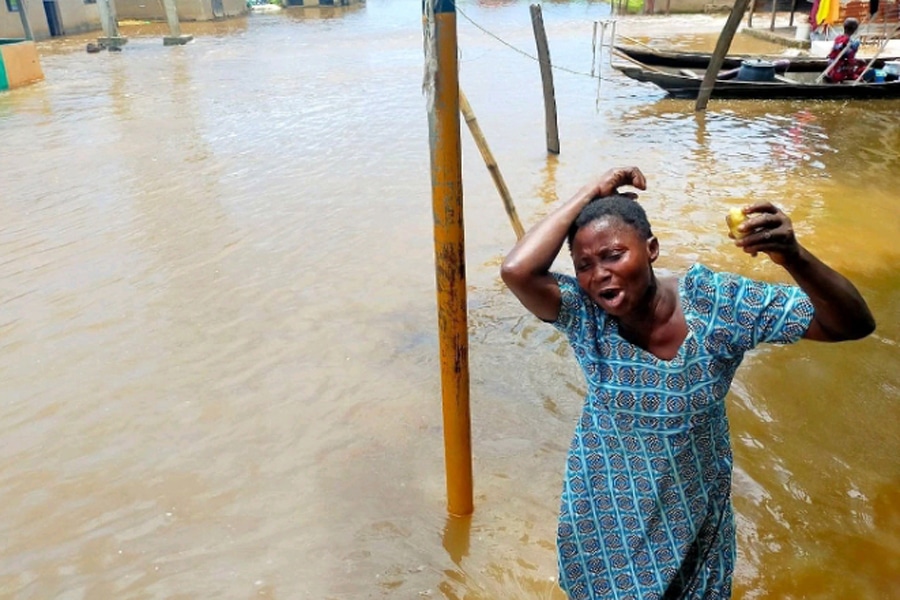
The floods wrecked and are still wrecking a Farmland which is estimated at $20 million; what is easily Nigeria’s largest private farming enterprise. We are not even talking about the damage to small-farm holders whose livelihoods have also been washed away. Individuals traveling from Lagos to Abuja, a journey which ordinarily takes 10 hours (even at the worst of time) took several days with many people becoming stuck on the road in various ways.
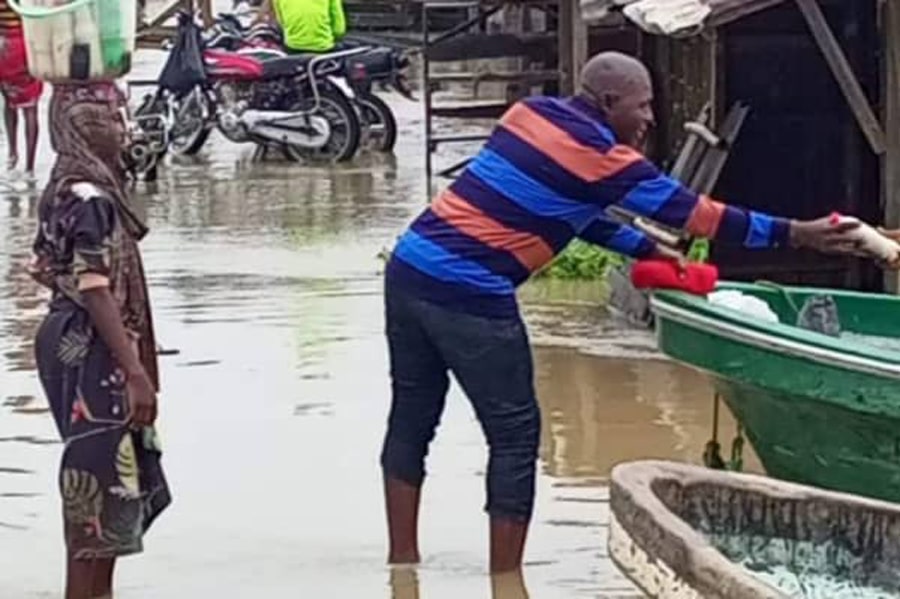
That was only one of the many tales of misery from the current floods. My friends and relatives were also affected by this disaster. My biggest concern is for the children I work with. Their community was equally affected. Some of them lost their parents in the process. The flood separated families. It was like the biblical red sea that got separated into two. Crossing over was a challenge leaving them with no option than to remain where they are.
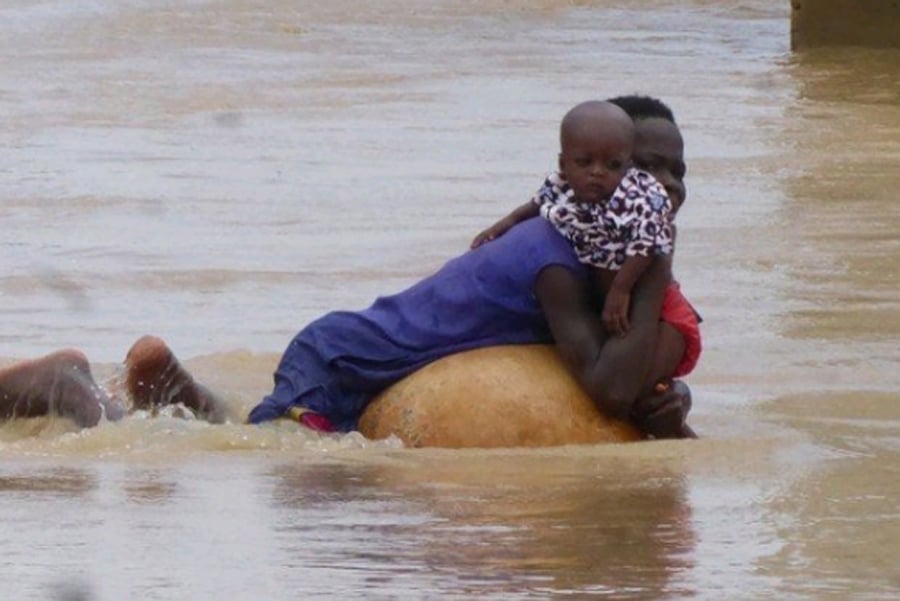
The floods have severely impacted these children's lives; they are unable to stay in school, their parents have lost their means of livelihood, and their community has no access to good food and other basic necessities.
I regard this as an environmental and emotional trauma.
My team and I have done the little we can to help them out. These children need shelter, clothing, food and education. I wish that the flood will come to an end and normalcy begins.
Peace Day activities from South America
By Lissette Mateus Roa, Co-Facilitator, Goldin Global Fellows
In 1981, the United Nations declared that September 21 would be observed as the International Day of Peace, devoting the day to ‘commemorating and strengthening the ideals of peace within and among all nations and peoples’. Now, the day is observed worldwide with many grassroots leaders and activists using it as a day to promote their activities and causes. Our 2022 Global Fellows (Spanish Edition) have been doing just that, by utilizing this opportunity to engage with their communities, peers, politicians, and civil society groups to further messages and actions around peace and healing. See what some of them have been up to below.
En 1981, las Naciones Unidas declararon que el 21 de septiembre sería señalado como el Día Internacional de la Paz, dedicando el día a “conmemorar y fortalecer los ideales de paz dentro y entre todas las naciones y pueblos”. Ahora, el día es celebrado en todo el mundo por muchos líderes y activistas de base que lo ven como un día para promover sus actividades y causas. Nuestros Global Fellows 2022 (edición en español) han estado haciendo exactamente eso, al utilizar esta oportunidad para interactuar con sus comunidades, pares, políticos y grupos de la sociedad civil para promover mensajes y acciones en torno a la paz y la sanación. Vea lo que algunos de ellos han estado haciendo a continuación.

Peace agreement progress in Colombia
By Geiner Alfonso Arrieta Hurtado, Goldin Global Fellow from Colombia
For the International Day of Peace, I participated in a discussion on the commemoration of the 5 years of Colombia’s Peace Agreement organised by ONU and Conversa Foundation at the National University of Colombia, in La Paz Cesar. The Peace Agreement in Colombia, signed by the FARC-EP and the national government, yielded great expectations for Colombians to make our dream of total peace come true once and for all. That hope was ongoing for six years, starting with the dialogues in 2012 until the sign off day on Nov 24th 2016. It gave us optimism for the new generations for whom we do not want to inherit the same fifty years of sadness which we endured due to the armed conflict. All those who signed off on the peace agreement believe in stopping the armed struggle and share a desire to see democracy within our politics. We strongly trust in peace in territories where the will of doing things better is present in governors, institutions, and population.
Therefore, it is necessary to stop systematic murders to affected population, social leaders, and peace agreement signatories. Peace is not just about the ceasefire and halting shooting, but it is about personal wellbeing too.

En el Día Internacional de la Paz, participé en un conversatorio sobre la conmemoración de los 5 años del acuerdo de paz en Colombia, organizado por la ONU y la Fundación Conversa, en la Universidad Nacional de Colombia, en La Paz Cesar. El Acuerdo de Paz en Colombia, firmado por las FARC-EP y el Gobierno Nacional, generó grandes expectativas en los colombianos de hacer realidad, de una vez por todas, nuestro sueño de tener una paz total. Esa esperanza duró seis años, desde los diálogos de paz que empezaron en el año 2012 hasta el día de la firma del acuerdo de paz el 24 de noviembre de 2016. Nos dió optimismo para las nuevas generaciones, a las que no queremos heredar los mismos cincuenta años de tristeza que sufrimos por el conflicto armado. Todos los que firmaron el acuerdo de paz creen en la necesidad de detener la lucha armada y comparten el deseo de ver una democracia verdadera dentro de nuestra política. Confiamos firmemente en la paz en los territorios donde la voluntad de hacer las cosas mejor esté presente en gobernantes, instituciones y la población civil.
Por ello, es necesario frenar los asesinatos sistemáticos a la población afectada, líderes sociales y firmantes del acuerdo de paz. La paz no se trata solo del alto al fuego y la interrupción de los disparos, sino también del bienestar personal.

Food, Culture, and Memory for facilitating Peace in Argentina
From Diana Rocio Gomez Torres, Goldin Global Fellow from Argentina
On September 22nd, Trenzar Memorias, Network of studies on memory and culture, carried out a workshop on "Cooking memories: What does what we eat tell us about our society and culture?" within the framework of the International Day of Peace at the Tecnópolis student fair in the city of Buenos Aires. Our objective was to ignite within the high school students the curiosity for cultural studies and about memory from their daily lives; as well as contributing to the construction of peace through the recognition and respect for cultural differences in Latin America".

"Self-recognition and that of cultural differences are fundamental factors to building peace."
Trenzar Memorias, Red de estudios sobre memoria y cultura llevará a cabo el taller “Cocinando memorias: ¿Qué nos dice lo que comemos sobre nuestra sociedad y cultura?” El 22 de septiembre en el marco del día Internacional de la Paz y de la feria estudiantil Tecnópolis en la ciudad de Buenos Aires. Nuestro objetivo es despertar en las y los estudiantes de secundaria de Buenos Aires la curiosidad por los estudios culturales y sobre la memoria a partir de sus cotidianidades; así como contribuir a la construcción de la paz a través del reconocimiento y respeto de las diferencias culturales en América Latina.
"El reconocimiento propio y el de las diferencias culturales son factores fundamentales en la construcción de la paz."

Promoting community dialogue between migrant populations and locals along the Venezuelan-Colombian border
From Natasha Duque Torres, Goldin Global Fellow from Venezuela
“Last week we carried out some activities in commemoration of the International Day of Peace. We visited a settlement in the rural area of Cúcuta, which is a Colombian city which borders Venezuela; here resides a large Venezuelan migrant population living alongside the Colombian population, where both groups have been welcomed and integrated. During the activity, we not only strengthened the construction of peace, mediation, and conflict resolution for the leaders of the community, but we also had a space for recreation with the children to create strategies for them to be the builders of peace in their communities. They called themselves the first brigade of "Guardians of Peace" of the Belén settlement.

The goal of the “Guardians of Peace” is for children to learn about peace and replicate what they have learned at home, so that during episodes of differences or conflicts that arise in their home and their communities they play an essential role to solve conflicts. Fulfilling their dream of being peacemakers.

“La semana pasada decidimos realizar una actividad en conmemoración del día internacional de la paz, visitamos un asentamiento del área rural de Cúcuta, Norte de Santander, el cual está integrado por población migrante venezolana y población colombiana que acogieron y apostaron a la integración.
Durante la actividad no solo realizamos ejercicios de fortalecimiento en construcción de paz, mediación y resolución de conflictos con las lideresas de la comunidad, sino que además tuvimos un espacio de esparcimiento con los niños; Esto con la finalidad de crear estrategias para que ellos mismos sean los constructores de paz de sus comunidades. Durante la jornada, los niños se autodenominaron como “La Primera Brigada de Guardianes de la Paz" del asentamiento Belén. El objetivo de los Guardianes de la Paz es que lo niños aprendan diferentes temas en materia de paz y que puedan a su vez replicar esto en sus casas; así, durante los episodios de diferencias o conflictos que surjan en su hogar y sus comunidades, ellos pueden jugar un papel fundamental para resolverlos. Ellos sueñan con ser forjadores de paz.”

YOLRED Begins Apprenticeship Program for Children Born of War
By Geoffrey Omony, 2018 Goldin Global Fellow, Uganda
We are delighted to announce the launch of YOLRED’s new apprentice program for Children Born of War (CBOW). In the Northern Ugandan context, CBOW refers to children who were born during captivity to combatants under the Lord’s Resistance Army. The war ended over a decade ago, but there are now approximately 6,000-8,000 CBOW living in Northern Uganda, many in Gulu district (where YOLRED is based). YOLRED have carried out extensive activities with the war-affected community, and we have found that what is most required for children born of war is economic empowerment and support. There are organisations conducting research projects and doing advocacy work, like ours, to try and reduce stigma against CBOW on a mass scale, but what is really lacking for CBOW is adequate livelihood opportunities. Even within organisations which try to tackle discrimination against CBOW there is a lack of job opportunities for them.

For this reason, YOLRED began thinking about a new initiative specifically designed to address this gap and to offer a form of economic empowerment which was not being attended to elsewhere, and thus in February 2022, we began this apprenticeship. YOLRED was provided with financial assistance to pilot the apprenticeship program for 6 months, to test the model and assess how it could work in practice. This donation funded the pilot program from February – July 2022; recognizing the importance of this apprenticeship and what it promotes, we have been awarded a grant from the CBOW project to fund this program for an additional year.
“The importance of this apprenticeship and what it promotes has been recognized by the CBOW Project; we are delighted to announce that we have been awarded a grant from them to continue this program for an additional year.”
This project was born out of an identified need amongst war-affected youth and is focused on children born of war (who are a category of marginalized youth in Northern Uganda), with greater attention paid to girls who face greater burdens. This program has been initiated to provide a career pathway for these marginalised young people as well as on-the-job training, and ultimately economic and social empowerment. Economic empowerment is the best way to support those most impacted by the conflict, and something we at YOLRED believe is essential to the continuation of a peaceful existence in the region.

The current apprentice, who is a young woman, has been employed with YOLRED since February 2022; her parents are categorized as the formerly abducted, and she was born in captivity. Her parents managed to escape the conflict when she was a young girl, but nonetheless she found reintegration a challenge due to environment she returned to, which stigmatizes CBOW. Of this opportunity, she states the following:
“Being an apprentice at YOLRED is a tremendous and miraculous thing that has ever happened to me. It has empowered me to be able to support myself and my close associates. Many people think that children born of war cannot do anything productive in life as a result of the traumatic experiences we incurred. This job will allow me to prove them wrong because I am able to challenge their negative perceptions about children born in captivity and show the positive ways in which we can work and interact with others, reducing the level of stigma on me and other children born of war. With my experience as an apprentice in mind, I feel any apprenticeship opportunity will be a great help to my brothers and sisters who were also Born of War.”
Having run this program for six months we have recognized its extreme value and importance not just the individual apprentice but for the wider CBOW community in Northern Uganda. Positions like this help to combat stigma against CBOW, especially for girls and women, but can also encourage other organisations and companies to follow suit and offer similar programs.

Extensive research has been done in Northern Uganda to assess the impact of the protracted conflict (which took place from 1987-2006) on children, including children abducted to serve in the Lord’s Resistance Army and children who were born in captivity. Many ex-child soldiers and CBOW who have returned still do not consider themselves free; they remain confined due to post-conflict struggles and excessive stigma and exclusion. As an organization which supports peace in the region, we are particularly focused on providing economic opportunities to those who face stigma or marginalization as a result of the conflict. There is also a lot of intergenerational trauma for children born in captivity who, if their background becomes known, are often labelled the dehumanising terms ‘rebel children’. These children experience a lot of social exclusion and bullying (which can lead to school-dropouts or desire to move to other cities), as they are often not accepted by extended family members and peers. Which is why this apprenticeship program is so valuable and important.

YOLRED adopt a ‘nothing about us without us’ policy and our initiatives are informed by local impact agendas. Our efforts are rooted in the region and led by Acholi people, rather than an approach which is imposed on us, and we centre survivors-needs in all of our programs.
Hands-On Peace: how youth leadership leads to peace
By Jamal Alkirnawi, 2018 Goldin Global Fellow, Rahat, Israel

"We all feel that the violence in Israeli society is increasing and threatening to get out of control. To prevent this grim scenario, it is not enough to deploy police forces and create deterrence. We must deal with the unrestrained functioning of the social networks that intensify the conflict in general and among the younger generation in particular."

The availability of social networks and electronic devices has created echo-chambers that drastically reduce the amount of information that contradicts and challenges our accepted perceptions. This significant drop in exposure to reliable and critical sources of information affects the youth specifically, resulting in herd behavior of acting without critical and adequate thoughts. This phenomenon can be explained by the growing sense of individualization among the post-1980 generations. These generations are the Y, Millennials, Z, and A generations, which we understand as Gen Y refers to those born between 1980 and 1985; Millennials were born between 1986 and 1995; Generation Z was born from 1996 until 2010; and the newest generation, generation alpha, are those born between 2010 and 2020s.
The culture of the internet interwoven with traditional beliefs oftentimes creates a contradiction between old and new values. Consequently, the tension we are observing in our Israeli communities in general, and particularly the Bedouin community, represents a period of transition from tradition to modernization. On one hand, our older generation Y group maintains their norms and practices; their traditions. On the other hand as the era of the internet permeates social networks, individualization has rapidly become a symbol of freedom and liberty. This, in turn, shapes the identity, language, and behavior of the members of Arab society. For instance, the usual norm in the Arab community is that families can make important decisions in determining the course of individuals’ lives. However, since the rise in internet usage the dynamic has become less and less reliant on the family and community. Everyone is occupied with his or her own virtual world and unable to create social contacts with outside environments, which is, in this case, their community.

In the recent escalation and the extreme cases of violence in the cities involved, we have seen the extreme consequences of this phenomenon. Teenagers got carried away by a wave of radicalization and instigation; they took to the streets to sow anarchy. Notable cases of this phenomenon are the events of “Operation Guardian of the Walls”, in which violent incidents and large-scale riots took place across Israel in May 2021. Hundreds were injured and three casualties were reported. This was overwhelming proof demonstrating the need to better educate teenage boys and girls to reduce the severe violence and incitement on digital networks.

To address the issue we initiated a new project in 2021. It is operated by the New Dawn Association in the Negev, a Bedouin-Jewish partnership located in the city of Rahat. So far, over 600 students in the Rahat area have been participating and benefiting from the series of educational sessions. We are currently looking into expanding the outreach to include the youth from nearby areas. The project promotes leadership programs and imparting skills to youth in the Bedouin society. Our long-term goal is to develop a generation of online activists who promote respectful democratic discourse and curb the violence and ranting therein.
To do this, we devote a lot of our resources to creating knowledge. We develop a wealth of expertise and tools that help the youth navigate the internet well. These include basic knowledge of principles of democracy, the difference between freedom of expression and incitement/hate speech, and how to create respectful discourses when engaging in online dialogues.
Our initiative of educating the Bedouin youth could not have been rolled out without the support from the partnerships, and foundations that sponsored in each and every capacity. We sincerely thank Eli Hurvitz and Foundation קרן שותפות for the generous and indispensable championship.
READ MORE AT
- https://www.jdn.co.il/video/1794825/
- https://www.israelhayom.co.il/magazine/hashavua/article/10194654
